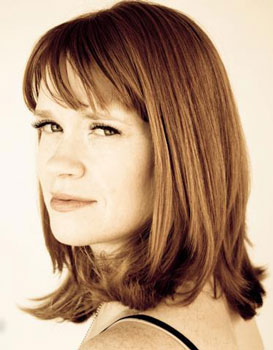PMS 15 | 2016
Emily Rapp Black is an American nonfiction writer and essayist responsible for two memoirs, Poster Child: A Memoir and The Still Point of the Turning World. A former Fulbright scholar and James A. Michener Fellow, Black holds a BA from Saint Olaf College, an MTS from Harvard University, and an MFA in Fiction and Poetry from the University of Texas. In addition to her academic achievements, Black has received accolades and recognition for her work from the Rona Jaffe Foundation, the Jentel Arts Foundation, the Corporation of Yaddo, the Fine Arts Work Center in Provincetown, Fundacion Valparaiso, and Bucknell University, where she was the Philip Roth Writer-in-Residence.
 After stints teaching literature and writing at Antioch University-Los Angeles, UCLA Extension, the Lighthouse Writers' Workshop, the Taos Writers' Workshop, the Gotham Writers’ Workshop, 24PearlStreet, the Santa Fe University of Art and Design, and serving as the Joseph Russo Chair in Creative Writing at the University of New Mexico, Black is now a permanent faculty member with the University of California-Riverside Palm Desert MFA Program in Creative Writing and the Performing Arts. Her work has been published in various well-known mediums such as VOGUE, The New York Times, Huffington Post, The Sun, The Rumpus, Popular Mechanics, Slate, TIME, Redbook, Wall Street Journal, Psychology Today, as well as other publications. Black currently reviews books on a regular basis for The New York Times, the Los Angeles Times, and the Boston Globe.
After stints teaching literature and writing at Antioch University-Los Angeles, UCLA Extension, the Lighthouse Writers' Workshop, the Taos Writers' Workshop, the Gotham Writers’ Workshop, 24PearlStreet, the Santa Fe University of Art and Design, and serving as the Joseph Russo Chair in Creative Writing at the University of New Mexico, Black is now a permanent faculty member with the University of California-Riverside Palm Desert MFA Program in Creative Writing and the Performing Arts. Her work has been published in various well-known mediums such as VOGUE, The New York Times, Huffington Post, The Sun, The Rumpus, Popular Mechanics, Slate, TIME, Redbook, Wall Street Journal, Psychology Today, as well as other publications. Black currently reviews books on a regular basis for The New York Times, the Los Angeles Times, and the Boston Globe.
Black’s second memoir, The Still Point of the Turning World, was hailed as a New York Times bestseller, an Editor’s Pick, and a finalist for the PEN Center Literary Award in Nonfiction. The novel chronicles her son Ronan’s diagnosis with Tay-Sachs and the limited and precious time Black spent with him in the months following the identification of the disease.
In January 2015, the University of Alabama-Birmingham was fortunate enough to have Black perform a reading from The Still Point of the Turning World and answer audience questions during UAB’s Visiting Writers Series. Hearing her read some of the account of her life and experiences with her son’s Tay-Sachs diagnosis, while immensely poignant, provided a bit of humor to an otherwise notably bleak subject. In addition to the captivating vocal rendition of excerpts of her memoir, audience members were gifted with Black’s advice about taking time to experience life while in the midst of writing. Black urged audience members’ questions about writing their own life stories with a simple, yet poignant, “Nobody cares if you write a book…Only you care!” This realness translates beautifully, even shockingly, from her work right into the minds of her audience, making the text unforgettable not only because of its unique brand of tragedy, but also because it is accessible and candid. With such an immense talent for honesty, it comes as no great shock that Huffington Post has gone so far as to recommend Black’s work as “Required Reading for Women.”
While reading The Still Point of the Turning World, I found it particularly helpful in dealing with what not to say to those in moments of duress and grief. Experiencing Black’s work inevitably serves to reiterate the importance of careful consideration and sensitivity when encountering someone who has experienced or is in the midst of a personal heartbreak. The book captures various priceless instants between Black and her son while illuminating the catharsis involved in writing many of those moments as they unfolded before her. Black’s memoir reminds us that immense power exists in words, as she writes, “writing would not save Ronan. But, I thought, it might save me.”
Black writes about grief as something brutally visceral yet survivable all at once. In her essay “Grief Magic” for The Rumpus, she says of the aftermath of Ronan’s passing, “In reality (not the self-created one), I’ve just weathered one of the worst possible scenarios an adult woman can face, and I’m still here. I survived the sorrow and am still reaching out for life.” In her work, we are able to glimpse her pain because she is blunt enough to put it out there—no frills and completely devoid of the candy-coating designed to help gulp the hurt down with greater ease. Still, hope exists even after that “worst possible scenario.” Black survives. She thrives. And she writes all of it straight.
It was an honor to conduct this interview with Black about her writing process, her memoir’s reach, and what comes next. I hope you’ll enjoy reading her words as much as I enjoyed speaking with her about them.



